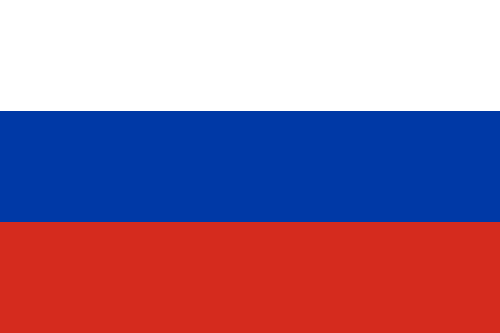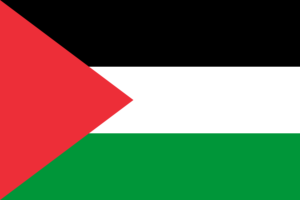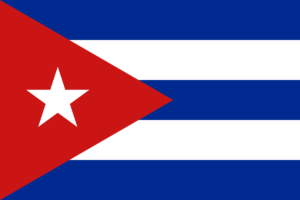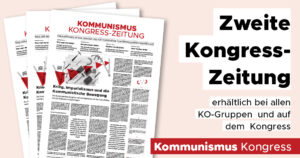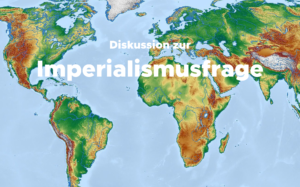Zur Frage des Imperialismus / On the question of Imperialism
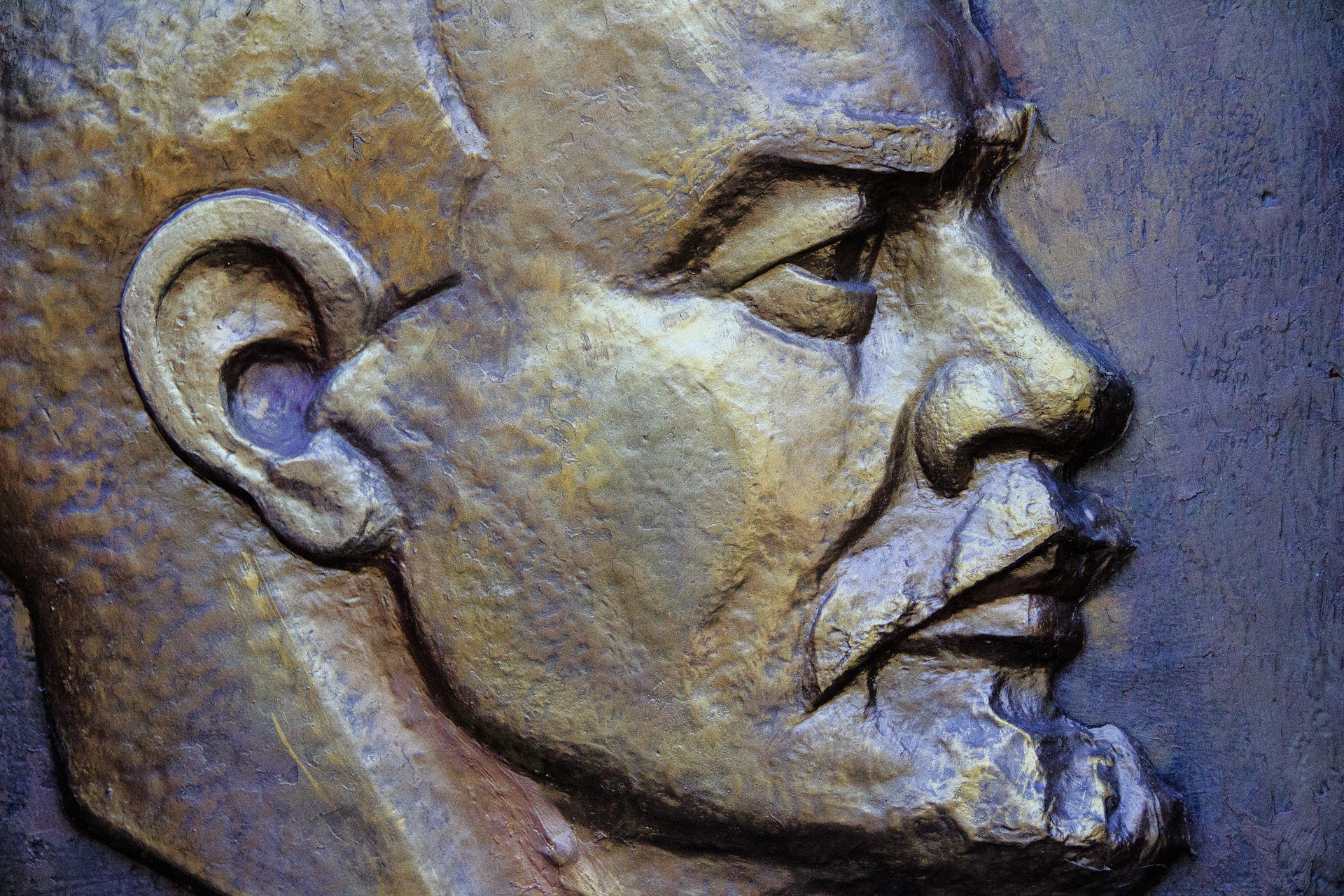
Der Text als pdf in Deutsch / In English
Wir veröffentlichen an dieser Stelle einen Diskussionsbeitrag des Genossen Andreas Sörensen, Vorsitzender der Kommunistischen Partei Schwedens (SKP). Wir bedanken uns bei der SKP für diesen Beitrag und die freundliche Erlaubnis zur Veröffentlichung
Here we publish a contribution by comrade Andreas Sörensen, chairman of the Communist Party of Sweden (SKP) on the analysis of imperialism. We want to thank the SKP for this contribution and the friendly permission to publish it.
Eine der wichtigsten Fragen, vor denen wir stehen, ist die Frage des Imperialismus und die richtige Charakterisierung des Kapitalismus in seiner imperialistischen Phase. In der Kommunistischen Partei Schwedens (SKP) diskutieren wir dieses Thema seit einiger Zeit, und wir kommen zu immer deutlicheren Schlussfolgerungen. In diesem Artikel werde ich versuchen, meine Sichtweise darzulegen, in der Hoffnung, nicht nur die Debatte in Schweden, sondern auch die internationale Debatte innerhalb der kommunistischen Bewegung zu fördern.
Ich möchte mit einem sehr konkreten Beispiel beginnen und aus diesem Versuch einige grundlegende Schlussfolgerungen ziehen, von denen einige im Widerspruch zu der Art und Weise stehen, wie die kommunistische Bewegung den Imperialismus und die imperialistische Politik traditionell betrachtet. Natürlich riskiere ich, im Unrecht zu sein, aber wenn doch, dann hoffe ich, dass ich geholfen habe, Fragen zu stellen, die beantwortet werden müssen, und indem ich eine Beantwortung dieser erzwinge, werde ich die Debatte gefördert haben!
Litauischer Imperialismus
Litauen ist ein armes Land. Das Durchschnittsgehalt liegt bei rund 800 Euro pro Monat (es ist wichtig, sich daran zu erinnern, dass dies bedeutet, dass die Hälfte der Arbeitnehmer im Land ein niedrigeres Gehalt haben!). Das bedeutet, dass Sie, wenn Sie relativ zentral in einer litauischen Stadt wohnen, fast Ihr ganzes Gehalt für Ihre Miete ausgeben müssen, wenn Sie in einer Dreizimmerwohnung wohnen. Außerhalb der zentralen Stadtteile müssen Sie nur die Hälfte Ihres Gehalts für eine gleichwertige Wohnung ausgeben. Nachdem Sie Ihre Miete bezahlt haben, muss Ihr Gehalt auch für Ihre anderen Ausgaben wie Essen, öffentliche Verkehrsmittel, Kleidung und so weiter aufkommen.
Die Tatsache, dass die Löhne in Litauen niedrig sind, zieht ausländische Investitionen an. Viele dieser Investitionen kommen aus Schweden. Schwedische Kapitalisten machten 2016 fast ein Fünftel aller ausländischen Investitionen aus. Die beiden Sonderwirtschaftszonen Litauens in Klaipeda und Kaunas ziehen wahrscheinlich viele dieser Investitionen an. Schwedische Unternehmen wie Tele2, Telia Sonera, ABB, IKEA, Swedbank und SEB haben alle große Investitionen in dem Land. Litauen ist trotz seiner Größe der viertgrößte Lieferant von Möbeln für IKEA, was bedeutet, dass mehr Möbel von IKEA in Litauen als in Schweden produziert werden. Es ist offensichtlich, dass niedrige (wir sollten nicht wirklich von niedrigen Löhnen sprechen, sondern von niedrigeren Löhnen) Löhne und schlechte Arbeitsbedingungen Investitionen anziehen.
Es entsteht das Bild einer Nation, die von den großen Imperialisten ausgebeutet wird. Die Menschen und die Arbeiter werden unter Druck gesetzt, weil sie kapitalistischen Profit brauchen. Dieses Bild ist jedoch fehlerhaft. In jeder kapitalistischen Nation gibt es eine Dualität, die ich hoffentlich mit meinem litauischen Beispiel zeigen kann.
Die ausländischen Direktinvestitionen Litauens
Trotz der Tatsache, dass die Investitionen aus reicheren Ländern zunehmen, scheint dies die litauischen Kapitalisten nicht davon abzuhalten, ihre eigenen Investitionen zu tätigen. Werfen wir einen Blick auf die Nachbarn Litauens.
In Weißrussland sind die litauischen Kapitalisten nach Russland und Zypern die drittgrößten Investoren (die zypriotischen Investitionen sind wahrscheinlich indirekt russisch, da eine Reihe von Oligarchen das Land nutzen, um Steuern in Russland zu vermeiden). Litauisches Kapital ist in mehr als 500 weißrussischen Unternehmen angelegt und „jeder zweite reiche Litauer hat Geschäfte in Weißrussland“, um einen litauischen Parlamentarier zu zitieren. Die Investitionen, die von Litauen bis Belarus jährlich getätigt werden, belaufen sich auf rund 80 Millionen Dollar [1]. Die Investitionen aus Litauen konzentrierten sich vor allem auf das Einzelhandelsgeschäft, wo vor allem die Firma Sosedi groß geworden ist. Auch im Energiesektor wurden einige Investitionen getätigt, wo die litauische Modus-Gruppe im Bereich Solarstrom tätig ist [2].
Investitionen in Solarstrom sind nicht nur auf Weißrussland beschränkt, sondern werden auch in Polen getätigt, wo die Sun Investment Group 200 Millionen Dollar in den Bau von Solarstromanlagen investiert [3]. Neben dem Solarstrom investieren litauische Unternehmen in den Einzelhandel, und 2017 kaufte das litauische Unternehmen Maxima eine der größten polnischen Einzelhandelsketten Stokrotka. In der Ukraine sind die größten litauischen Investitionen auch im Einzelhandel zu finden [4].
In Lettland konzentrierten sich die Investitionen vor allem auf den Bausektor. Große Unternehmen wie LB Lords Asset Management und Capitalica Asset Management haben 250 Millionen Euro in Bauprojekte in Lettland investiert [5].
Also, was ist Litauen?
Ist Litauen ein ausgebeutetes Land oder ein ausbeuterisches Land? Die Frage ist unmöglich zu beantworten, weil sie falsch formuliert ist. Litauen ist beides, und wenn es beides ist, wird die Charakterisierung als ausgebeutete oder ausbeuterische Nation überflüssig und dient stattdessen dazu, die Klassenwidersprüche innerhalb Litauens zu trüben. So wie in jedem anderen Land, wo die Kapitalistenklasse an der Macht ist.
In jeder kapitalistischen Nation gibt es zwei Hauptklassen: die Kapitalistenklasse und die Arbeiterklasse. Ihre Interessen sind diametral entgegengesetzt. In jedem Land wird die Arbeiterklasse ausgebeutet und in jedem Land beuten die Kapitalisten aus.
Wenn man eine Nation als ausgebeutet und eine andere als Ausbeuter kategorisiert, setzt man den Ausbeuter mit den Ausgebeuteten gleich. Das innere Verhältnis und der Widerspruch zwischen ihnen werden zugunsten eines Widerspruchs zwischen der ausgebeuteten Nation und der ausbeuterischen Nation beiseite geschoben. Das Endergebnis ist, dass der Kapitalist innerhalb der ausgebeuteten Nation genauso ausgebeutet wird wie die Arbeiterklasse.
Die litauischen Arbeiter werden von ausländischen und einheimischen Kapitalisten ausgebeutet und unterdrückt, während die litauischen Kapitalisten die arbeitende Bevölkerung anderer Länder ausbeuten und unterdrücken.
Der Klassenkampf bleibt der größte Widerspruch – in jeder Situation. Aber was hat das mit dem Imperialismus zu tun?
Imperialismus als System
In früheren Diskussionen innerhalb unserer Partei haben wir den systemischen Charakter des Imperialismus festgehalten. Damit meinen wir – vereinfacht gesagt – die Beteiligung jeder kapitalistischen Nation an einem System, das durch eine Reihe von Prozessen und Merkmalen gekennzeichnet ist.
In seinem Buch „Der Imperialismus als höchstes Stadium des Kapitalismus“ beschrieb Lenin, wie das kapitalistische System in ein neues Stadium eingetreten war: das imperialistische Stadium. Das bedeutete natürlich, dass alle kapitalistischen Nationen (d.h. die Nationen, wo die Kapitalisten an der Macht waren) jetzt im Rahmen des imperialistischen Systems existierten. Die neue Phase war durch eine Reihe von Prozessen und Merkmalen gekennzeichnet:
- Die Konzentration von Produktion und Kapital hatte ein hohes Niveau erreicht und die Konzentration setzte sich fort. Zu einem bestimmten Zeitpunkt hatte der Zusammenschluss ein solches Niveau erreicht, dass er den freien Wettbewerb als bestimmendes Merkmal des Kapitalismus ersetzt hatte. Der freie Wettbewerb hörte nicht auf zu existieren, aber außerhalb des freien Wettbewerbs hatten sich Monopole gebildet und waren nun definierend für den Kapitalismus geworden.
- Eine Fusion von Bank- und Industriekapital zu Finanzkapital. Durch die Fusion der Großbanken mit den Großindustrien entstanden riesige Konglomerate, in denen die Banken als zentrale Vermittler fungierten. In einem schwedischen Kontext hat C-H Hermansson die Personalunion der schwedischen Banken mit der Industrie analysiert.
- Der Kapitalexport wird zu Lasten des Warenexports erhöht. Die Kapitalisten jedes Landes suchen immer nach den profitabelsten Investitionen. Wenn diese nicht mehr im eigenen Land gesucht werden können, suchen die Kapitalisten diese Investitionen im Ausland, wo die Löhne niedriger sind, die Bedingungen für die Arbeiter schlechter sind und wo folglich die Gewinne höher sind. Lenin nannte diese Heimatmärkte übersättigt – sie waren nicht mehr die profitabelsten Märkte und mit Investitionen gesättigt.
- Die Welt war unter dem Großkapital aufgeteilt worden und wurde immer wieder neu aufgeteilt. Durch die Bildung von Trusts, Syndikaten und Kartellen schließen sich große Monopole zusammen, um dem Wettbewerb mit anderen Monopolen besser zu begegnen. In Schweden gab es eine Reihe bekannter Kartelle, wie z.B. das Straßenkartell, bei dem sich die Baumonopole dem Straßenministerium anschlossen (diese Abteilung existiert nicht mehr), um die Preise für die Asphaltierung künstlich zu erhöhen.
- Die Welt wurde unter den Großmächten aufgeteilt. Die Großmächte haben die Welt in Interessengebiete aufgeteilt, in denen sie die Märkte kontrollieren. Früher fand das durch Kolonien statt, heute werden andere Methoden angewandt. Da alle Monopole und Unternehmen jederzeit wachsen müssen, zwingt die Teilung der Welt zu einer Neuaufteilung, die wiederum ein erneutes Wachstum der Monopole ermöglicht.
Alle diese Merkmale und Prozesse wurden 1916 von Lenin identifiziert und erscheinen uns heute noch deutlicher. Es ist wichtig festzustellen, dass das, was als Merkmale des kapitalistischen Systems in seiner imperialistischen Phase diskutiert wurde, genau das ist – Merkmale des Systems. Diese Merkmale charakterisieren nicht die einzelnen Länder. Es ist unmöglich, jedes einzelne Land neben diese Merkmale zu stellen, um zu entscheiden, inwieweit sie imperialistisch sind. Dass ein Land eine Produktion hat, die konzentrierter ist als ein anderes, oder dass ein Land einen entwickelteren Kapitalexport hat als ein anderes, macht nicht das eine imperialistischer als das andere.
Lenin hat diese Merkmale und Prozesse, die das gesamte System charakterisieren, identifiziert. Alle kapitalistischen Nationen, die sich früher im Rahmen des freien Wettbewerbs befanden, befanden sich nun im Stadium des imperialistischen Kapitalismus. Natürlich hatte sich von einem Tag auf den anderen nicht viel für die einzelnen Unternehmen oder Monopole geändert, aber der freie Wettbewerb hatte aufgehört, das kapitalistische System zu definieren. Stattdessen war es durch Monopole definiert. Wichtig ist zu beachten, dass jedes dieser Merkmale und Prozesse (d.h. die anhaltende Konzentration des Kapitals, das anhaltende Wachstum des Kapitalexports auf Kosten der Warenexporte und so weiter) in jedem einzelnen kapitalistischen Land aktiv ist.
Heute ist dies genauso wahr wie damals, wie das litauische Beispiel zeigt. Auch dort sind diese Prozesse aktiv. Auch der Markt in Litauen ist überreif und zwingt die litauischen Kapitalisten ins Ausland. Dies ist ein Prozess ohne Ende.
Das bedeutet – um es deutlich zu sagen -, dass jede Kapitalistenklasse in jeder kapitalistischen Nation am imperialistischen System teilnimmt und sich an die Gesetze des Systems hält. Das schließt nicht aus, dass die Kapitalisten einer Nation schwächer sind als die einer anderen. Sie schließt auch nicht aus, dass die Erwerbsbevölkerung einer Nation ärmer ist als die einer anderen. Darüber hinaus schließt sie nicht aus, dass die Konzentration von Kapital und Produktion in einigen Ländern weiter fortgeschritten ist als in anderen, oder dass der Kapitalexport in einigen Teilen der Welt stärker gewachsen ist als in anderen. Der Kapitalismus – also der Imperialismus – entwickelt sich nicht gleichmäßig, sondern ungleichmäßig und zeigt daher zu jeder Zeit Unterschiede.
Das bedeutet auch, dass wir die Welt nicht in imperialistische Nationen und kapitalistische Nationen aufteilen können, sondern dass jede kapitalistische Nation im Rahmen des imperialistischen Systems handelt. Die relative Stärke in der Kapitalistenklasse eines bestimmten Landes ist in diesem Zusammenhang irrelevant – sie entscheidet nicht über den Charakter des Wirtschaftssystems, das innerhalb des Landes existiert, auch wenn sie für die Beurteilung der Stärke verschiedener Staaten relevant ist. Das bedeutet eine Ablehnung der These, dass es kapitalistische Kategorien im Vergleich und im Gegensatz zu imperialistischen Kategorien gibt.
Schlussfolgerungen
Dies ist nur eine kurze Darstellung eines sehr komplexen Problems, das in diesem Artikel bei weitem nicht in seiner Gesamtheit analysiert wird, aber ich denke, dass es dennoch möglich ist, eine Reihe von relevanten Schlussfolgerungen zu ziehen, die uns beim Verständnis des Imperialismus und bei unserer Organisationstätigkeit helfen können.
- Eine Unterscheidung zwischen kapitalistischen Nationen, die darauf abzielt, sie entweder als ausgebeutet oder ausgebeutet einzuordnen, verdeckt den grundlegenden Widerspruch zwischen Arbeit und Kapital. Eine Analyse, die sich auf Nationen statt auf die Komponenten konzentriert, aus denen sich die Nation zusammensetzt (d.h. die Klassenzusammensetzung einer bestimmten Nation), wird unweigerlich dazu führen, dass die grundlegende Klassenunterscheidung in jeder Nation verdeckt wird.
- Es gibt keinen Antiimperialismus, der vom Antikapitalismus getrennt ist. Die Vorstellung, dass man ein Antiimperialist sein kann, während man gleichzeitig eine Unterstützung für den Kapitalismus als Wirtschaftssystem beibehält, ist falsch, da er den Imperialismus vom Kapitalismus trennt und ihn auf einen politischen Ausdruck reduziert. Gegen imperialistische Kriege oder andere Ausdrucksformen des Imperialismus zu sein, ist kein Antiimperialismus.
- Jede Trennung zwischen imperialistischen Akteuren oder Nationen und kapitalistischen Akteuren oder Nationen bedeutet notwendigerweise die Anwendung der Analyse des Imperialismus auf jede einzelne Nation oder jeden einzelnen Akteur, was der Analyse des Systems entgegensteht. In dem Artikel behaupte ich, dass es keine Trennung zwischen Imperialisten und Kapitalisten geben darf. Eine solche Unterscheidung würde notwendigerweise dazu führen, dass willkürlich eine Art qualitative Grenze gezogen wird, wo ein bestimmter kapitalistischer Übergang zum Imperialismus erfolgt oder wo eine kapitalistische Nation imperialistisch wird. Dies wiederum zwingt uns, eine Reihe von Fragen zu stellen, wie z.B. „Bei welchem Niveau der Konzentration verwandelt sich ein bestimmtes kapitalistisches Land in ein imperialistisches Land“ oder „Zu welchem Zeitpunkt bedeutet die Ausweitung des Kapitalexports auf Kosten des Rohstoffexports eine Transformation von einem kapitalistischen zu einem imperialistischen Land“? Der Punkt ist hier, dass diese Argumentation in eine Sackgasse führt, in der man gezwungen ist, die Eigenschaften des Systems in Kriterien umzuwandeln, die auf jede einzelne kapitalistische Nation angewandt werden. Das ist jedoch nicht möglich und führt zu einer Überlegung auf Grundlage der Logik des geringeren Übels, wo kapitalistische Nationen im Gegensatz zu imperialistischen einen positiveren Anschein haben.
- „Die Demokratie entspricht dem freien Wettbewerb. Die politische Reaktion entspricht dem Monopol.“ Dieses Zitat stammt aus Lenins „Über eine Karikatur auf den Marxismus und über den ‚imperialistischen Ökonomismus‘“, die 1916 geschrieben wurde. Der Grund, warum ich es hier benutze, ist, dass es einen Punkt veranschaulicht, der oft vergessen wird, der aber unvermeidlich wird, wenn wir den Imperialismus als ein System betrachten. Das System des Imperialismus, d.h. der Kapitalismus in seiner Monopolstellung, erzwingt eine bestimmte Richtung in der Politik, weil es am besten zum Ziel der Monopole passt. Dies ist in jedem Land des imperialistischen Systems der Fall, denn in jedem Land regieren die Monopole. In jedem Land stehen die Monopole und die kapitalistische Klasse im Gegensatz zur arbeitenden Bevölkerung und müssen Schritt für Schritt in eine reaktionäre Richtung gehen, um sie zu unterdrücken. Da die Situation in jedem kapitalistischen Land ähnlich ist, ist die Politik jedes Landes in ihren Grundzügen ähnlich. Die Unterdrückung der Grundrechte der arbeitenden Bevölkerung findet überall auf der Welt statt: von Indien bis Bolivien, von Schweden bis Südafrika.
Das imperialistische System produziert eine bestimmte Art von Politik, die natürlich andere nationale Merkmale annimmt, sich aber qualitativ nicht von den in anderen Ländern präsentierten Politiken unterscheiden kann.
- Der Imperialismus ist dynamisch. Das ist sehr einfach zu sagen und scheint selbstverständlich zu sein, aber ich möchte es trotzdem berühren und erweitern. Der Imperialismus entwickelt sich ungleichmäßig, was bedeutet, dass einige Teile des Systems stärker entwickelt sein werden als andere, während bestimmte Regionen aufgrund günstiger Umstände einen Wachstumsboom erleben können. Es können Allianzen gebildet werden, die bestimmten Akteuren helfen, und technische Erfindungen können Monopole an die Front bringen. Das macht die Hierarchie im Imperialismus dynamisch – sie verändert sich ständig. Wir dürfen die Opposition der schwächeren Kapitalisten gegen die stärkeren nicht mit Antiimperialismus verwechseln.
Ein weiterer Aspekt der Dynamik des Imperialismus betrifft die Überreife eines Landes, die den Bedarf an Kapitalexport schafft. Dies ist keine absolute Kategorie, da einige Länder mehr überreif sind als andere. Der wichtigste Punkt dabei ist, dass jedes Land in Bezug auf seine eigene Bourgeoisie überreif ist. Für den schwedischen Kapitalismus ist der schwedische Markt überreif, und im Gegensatz zum schwedischen Markt stellt der litauische eine Alternative dar. Für den litauischen Kapitalismus ist der litauische Markt überreif, während der weißrussische oder lettische Markt Alternativen bleiben. Das bedeutet, dass sich in jedem Land die Kapitale vermischen und nebeneinander existieren: Ein Land kann ein Ziel für den Kapitalexport sein und gleichzeitig ein Ausgangspunkt für den Kapitalexport sein.
Ich hoffe, dass ich hiermit einen konstruktiven Beitrag zur Diskussion über den Imperialismus leisten konnte, der dazu beiträgt, die Diskussion in die richtige Richtung zu lenken. Die Analyse des Imperialismus steht im Mittelpunkt sowohl der Analyse als auch der Praxis des Kommunismus, und die Analyse, die wir durchführen, wird schwerwiegende Folgen für unsere Praxis haben. Daher ist es wichtig, dass eine kritische Diskussion mit dem Ziel stattfinden kann, eine tiefere Analyse des Imperialismus zu formulieren.
One of the most important question that we stand before is the question of imperialism and the correct characterization of capitalism in its imperialist stage. In the Communist Party of Sweden (SKP), we have for some time discussed this issue, and we reach ever more solid conclusions. In this article, I will try to present my view of it, in the hope of furthering not only the debate in Sweden, but the international debate within the communist movement.
I will start by one very concrete example, and from this try to draw some basic conclusions, some of which run contrary to the way the communist movement has traditionally viewed imperialism and imperialist policies. Of course, I run the risk of being in the wrong, but if I am, my hope is that I have helped pose questions that need answering, and in forcing these questions to be answered, have furthered the debate!
Lithuanian imperialism
Lithuania is a poor country. The average salary is around €800 a month (it is important to remember that this means that half of the workers in the country have a salary that is lower than this!). This means that if you live relatively central in a Lithuanian city, you have to spend almost all of your salary on your rent, if you are living in a three-room apartment. Outside the central parts of the cities, you only have to spend half your salary on an equalent apartment. After paying your rent, your salary must also pay for your other expidentures, such as food, public transportation, clothes and so on.
The fact that wages are low in Lithuania attracts foreign investments. A lot of these investments come from Sweden. Swedish capitalists accounted for almost one fifth of all foreign investments in 2016. The two economic free zones of Lithuania, located in Klaipeda and Kaunas probably attract a lot of these investments. Swedish companies, such as Tele2, Telia Sonera, ABB, IKEA, Swedbank and SEB all have large investments in the country. Lithuania is, despite its size, the fourth biggest supplier of furniture to IKEA, which means that more of IKEA’s furniture is produced in Lithuania than in Sweden. It is apparent that low (we shouldn’t really be talking about low wages, but rather lower wages) wages and bad working conditions attract investments.
The picture that emerges is of a nation exploited by the big imperialists. The people and the workers are pressured because the need for capitalist profit. However, this picture is flawed. There is a duality in every capitalst nation, which I hope to be able to show with my Lithuanian example.
The foreign direct investments of Lithuania
Despite the fact that the investments from richer countries increase, this does not seem to stop the Lithuanian capitalists from making their own investments. Lets take a look on Lithuania’s neighbors.
In Belarus, the Lithuanian capitalists are the third biggest investors, behind Russia and Cyprus (the Cypriot investments are probably indirectly Russian, since a number of oligarchs use the country to avoid taxes in Russia). Lithuanian capital can be found in more than 500 Belarusian companies and ”[e]very second rich Lithuanian has business in Belarus” to quote a Lithuanian parliamentarian. The investments made from Lithuanian to Belarus every year amount to around 80 million dollars. [1] The investments made from Lithuania has primarily been directed to the retail business, where above all the company Sosedi has grown large. The energy sector has also seen some investments, where the Lithuanian Modus Group is active in solar power. [2]
Investments in solar power are not limited to Belarus but are also made in Poland, where the Sun Investment Group are investing 200 million dollars to construct solar power parks [3]. Apart from solar power, Lithuanian companies are investing in retailing, and in 2017, the Lithuanian company Maxima bought one of the biggest Polish retail chains Stokrotka. In Ukraine, the biggest Lithuanian investments are also found in retailing.[4]
In Latvia, the investments have primarily been directed towards the construction sector. Big companies, such as LB Lords Asset Management and Capitalica Asset Management have invested 250 million Euro in construction projects in Latvia.[5]
So, what is Lithuania?
Is Lithuania an exploited country or an exploiting country? The question is impossible to answer, because it is falsely formulated. Lithuania is both, and if it is both, the characterization as an exploited or exploiting nation becomes superflous and instead, serves to cloud the class contradictions within Lithuania. Just as every other country with a capitalist class in power.
In every capitalist nation two main classes exist: the capitalist class and the working class. Their interests are diametrically opposed. In every country the working class is exploited and in every land the capitalists exploit.
When one categorizes a nation as exploited and another as an exploiter, one equates the exploiter with the exploited. The internal relationship and contradiction between them are set aside in favor of a contradiction between the exploited nation and the exploiting nation. The end result is that the capitalist within the exploited nation become just as exploited as the working class.
The Lithuanian workers are exploited and repressed by both foreign and native capitalists, while the Lithuanian capitalists exploit and repress the working population of other countries.
Class struggle remains the main contradiction – in every situation. But what does this have to do with imperialism?
Imperialism as a system
In earlier discussions within our party, we have maintained the systemic character of imperialism. With this we mean – simply put – the participation of every capitalist nation in a system characterized by a number of processes and features.
In his book Imperialism as the highest stage of capitalism Lenin described how the capitalist system had entered a new stage: the imperialist stage. Of course, this meant that all capitalist nations (that is, the nations with capitalists in power) now existed within the framework of the imperialist system. The new stage was characterized by a number of processes and characteristics:
- The concentration of production and capital had reached a high level and concentration continued. At a certain point, the concentration had reached such a level that it had replaced free competition as a defining feature of capitalism. Free compeition did not cease to exist, but outside of the free competition, monopolies had formed and had now become defining of capitalism.
- A merger of banking and industrial capital into finance capital. Through a merger of the big banks with the big industries, enormous conglomerates were created where the banks acted as central facilitators. In a Swedish context, C-H Hermansson has analyzed the personal union of the Swedish banks with industry.
- Capital export increases at the expense of commodity export. The capitalists of every country always seek the most profitable investments. When these no longer are to seek within the own country, capitalists seek these investments abroad, where wages are lower, conditions for the workers are worse and where, consequently, profits are bigger. Lenin called these domestic markets oversaturated – they were no longer the most profitable markets and had been saturated with investments.
- The world had been divided and kept being divided between big capital. Through the forming of trusts, syndicates and cartels big monopolies join together so as to more effectively meet competition from other monopolies. In Sweden there have been a number of famous cartels, such as the Road Cartel, where the construction monopolies joined the Department for Roads (this department no longer exists) to artificially raise prices for asfalting work.
- The world has been divided by the big powers. The big powers have divided the world into spheres of interest where they control markets. Previously done through colonies, other methods are now used. Because all monopolies and companies must grow at all times, the division of the world forces a redivision, which in turn allows monopolies to grow once again.
All of these features and processes were identified by Lenin in 1916 and they emerge even more clear to us today. It is important to note that what has been discussed as features of the capitalist system in its imperialist stage is just that – features of the system. These features do not characterize individual countries. It is impossible to place every single country next to these features to decide to what extent they are imperialist. That one country might have a production that is more concentrated than another, or that one country has a more developed capital export than another, does not make the more imperialist than the other.
What Lenin did was to identify these features and processes that characterized the entire system. All the capitalist nations that previously found themselves within the framework of free competition now found themselves in imperialist capitalism. Of course, from one day to the next, not much had changed for the individual companies or monopolies, but free competition had ceased to be defining for the capitalist system. Instead, it had come to be defined by monopolies. What is important to note is that each of these features and processes (ie the continuing concentration of capital, the continuing growth of capital export at the expense of commodity exports and so on) are active in every single capitalist country.
Today, this is as true as it was then, which the Lithuanian example shows. Also there, these processes are active. The market in Lithuania is also overripe, forcing Lithuanian capitalists abroad. This is a process without end.
This means – to speak clearly – that every capitalist class in every capitalist nation participates in the imperialist system, abiding to the laws of the system. This does not exclude the fact that the capitalists of one nation are weaker than those of another. It also does not exclude the fact that the working population of one nation is poorer than those of another. Additionally, it does not exclude the fact that the concentration of capital and production is more advanced in some countries than in others, or that capital export has grown more in some parts of the world than others. Capitalism – that is, imperialism – does not develop evenly, but unevenly and therefore, displayes differences at all times.
This also means that we cannot divide the world into imperialist nations and capitalist nations, but that each capitalist nation acts within the framework of the imperialist system. The relative strength in the capitalist class of a given country is in this context irrelevant – it does not decide the character of the economic system that exists within the country, even if it is relevant in judging the strength of different states. This means a rejection of the thesis that there are capitalist categories in relation and in opposition to imperialist categories.
Conclusions
This is only a short presentation of a very complex problem, which is far from analyzed in its entirety in this article, but I think that it is nonetheless possible to draw a number of relevant conclusions that can help us in understanding imperialism and in our organizing work.
- A distinction between capitalist nations that aims at categorizing them as either exploited or exploiting cover the basic contradiction between labor and capital. An analysis that focuses on nations instead of the components that make up the nation (ie, the class composition of a given nation) will inevitably lead to the basic class distinction in every nation being covered up.
- There is no anti-imperialism that is separate from anti-capitalism. The idea that one can be an anti-imperialist, while at the same time retaining a support for capitalism as an economic system is false, as it separates imperialism from capitalism, reducing it to a political expression. To be opposed to imperialist wars or other expressions of imperialism is not anti-imperialism.
-
Any
separation between imperialist actors or
nations and capitalist actors or nations
necessarily means the application of the analysis of imperialism on
every given nation or actor, negating the analysis of the system. In
the article, I maintain that there is no separation to be made
between imperialists and capitalists. Such a
distinction would necessarily lead to some sort of qualitative
boundary being arbitrarily set up, where a given capitalist
transitions into being an imperialist, or where a capitalist nation
transitions into being imperialist. In turn, this forces us to ask a
number of questions, such as ”At what level of concentration does
a given capitalist country transform into an imperialist country?”
or ”At what point does the expansion of capital export at the
expense of commodity export entail a transformation from a
capitalist country to an imperialist one?”
The point being made here is that this reasoning leads into a dead-end, where one is forced into converting the characteristics of the system into criteria applied to each capitalist nation. This application is not possible and leads into a reasoning based on the logic of the lesser evil where capitalist nations, as opposed to imperialist ones, retain a more positive aura. -
”Democracy
corresponds to free competition. Political reaction corresponds to
monopoly.” This quote is from Lenin’s A Caricature of
Marxism and Imperialist Economism, which was written in 1916.
The reason I use it here is because it illustrates a point often
forgotten, but which becomes inevitable when we view imperialism as
a system. The system of imperialism, that is, capitalism in its
monopoly-stage, forces a certain direction in politics, because it
best suits the aim of the monopolies. This is the case in every
country within the imperialist system, because in every country the
monopolies reign. In every country, the monopolies and the
capitalist class stand in opposition to the working population and
must take step after step in a reactionary direction to suppress
them. Because the situation is similar in every capitalist country,
the policies of each country are similar in its basic features. The
repression of the basic rights of the working population is occuring
all over the world: from India to Bolivia; from Sweden to South
Africa.
The imperialist system produces a certian kind of policy, which of course assume different national characteristics but cannot be qualitatively different from the policies presented in other countries. -
Imperialism
is dynamic. This is very easy to say and seems self-evident, but
I still want to touch upon it and expand upon it. Imperialism
develops unevenly, meaning that some parts of the system will be
more developed than others, while certain regions can experience a
boom in growth due to favorable circumstances. Alliances can be
formed that help certain actors and technical inventions can propel
monopolies to the front. This makes the hierarchy within imperialism
dynamic – it is ever-changing. We must not confuse the opposition
of weaker capitalists to stronger ones for
anti-imperialism.
Another aspect of the dynamism of imperialism concerns the overripeness of a country, which creates the need for capital export. This is not an absolute category, insofar as some countries are more overripe than others. The main point here is that every country is overripe in relation to its own bourgeoisie. For Swedish capitalism, the Swedish market is overripe, and in contrast to the Swedish market, the Lithuanian one represents an alternative. For Lithuanian capitalism, the Lithuanian market is overripe, whereas the Belarusian or Latvian markets remain alternatives. This means that in every counry, capitals intersperse and exist alongside each other: a country can be a destination for capital export, while at the same time being a point of departure for capital export.
With this, I hope that I have been able to form a constructive contribution to the discussion of imperialism that helps to propel the discussion in the right direction. The analysis of imperialism stands at the center of both the analysis and the practice of communism, and the analysis that we make will have serious consequences for our practice. Therefore, it is vital that a critical discussion with the purpose of formulating a deeper analysis of imperialism can take place.
[1] https://belarusdigest.com/story/investing-in-belarus-a-story-of-lithuanian-businessmen[2] https://belarusfeed.com/belarus-retail-top-foreign-investors/[3] https://www.thefirstnews.com/article/here-comes-the-sun-lithuania-pours-millions-into-polish-solar-energy-991[4] https://lithuania.mfa.gov.ua/en/ukraine-it/trade/trade-and-investment
[5] http://newsecbaltics.com/lithuanian-real-estate-investors-making-dent-real-estate-market/

